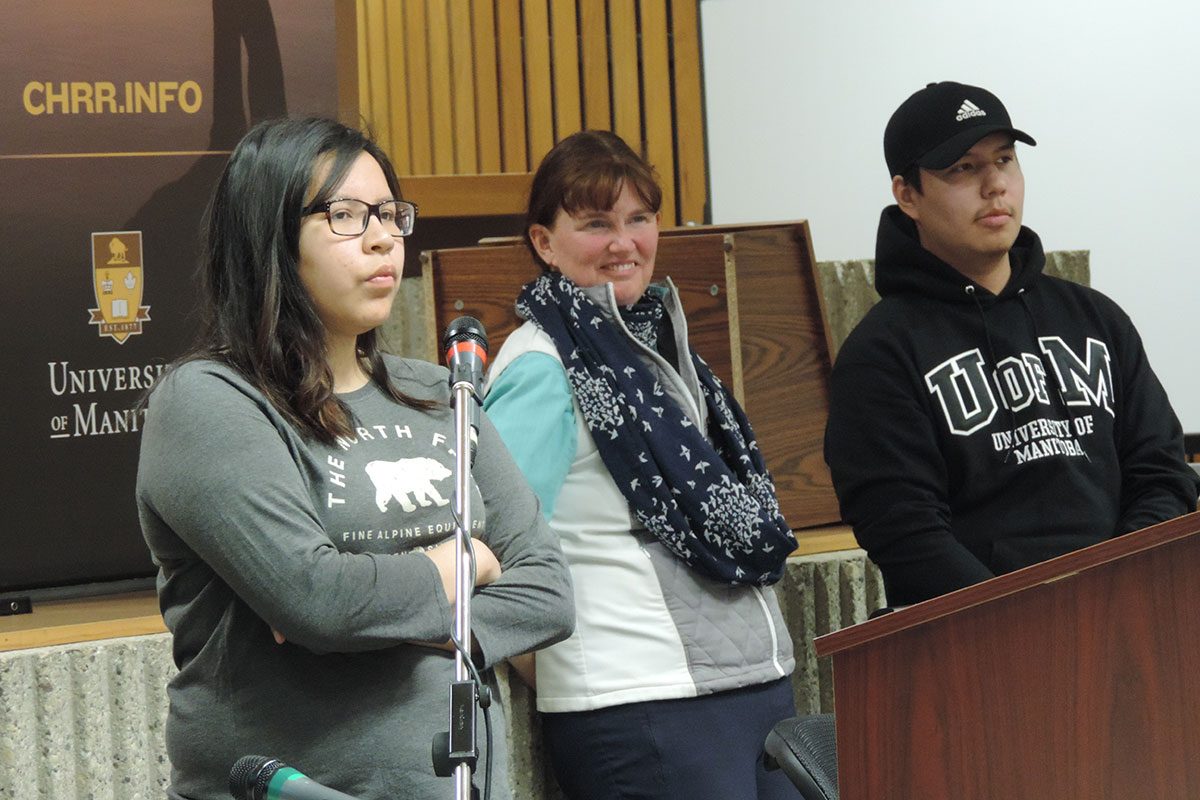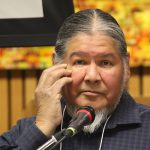
Lakeisha Barkman and Jerome Harper, shown here with their supervisor Prof. Shirley Thompson, won the audience prize for best student presentation at this year’s H2O conference.
First Nations and students collaborate on cleaner water
Seven years after the Assembly of Manitoba Chiefs launched its Water is a Human Right campaign, one in five homes in Garden Hill still had no toilet and residents hauled their drinking water in buckets. “This is hundreds of people who are still using pails,” said natural resources Prof. Shirley Thompson, who helped the community analyze its 2017 community survey data.
The survey results were presented by H2O program student Lakeisha Barkman on May 18 at the University of Manitoba’s fifth-annual First Nation water and sanitation security conference. Much of the research presented at the conference was funded by the Natural Sciences and Engineering Research Council of Canada under its Collaborative Research and Training Experience Program. The H2O program is exploring future funding options.
Even most Garden Hill families whose water is delivered to storage tanks report water supply problems. Water delivery trucks get stuck when the roads are bad or water isn’t delivered often enough to meet the needs of multiple families living in the same home because of the community’s housing shortage.
Undergraduate student Jerome Harper, who is from nearby Wasagamack, told about 60 conference participants that the Island Lake region’s five-year plumbing retrofit program was only partially successful. While 769 homes got water and sewer upgrades through local labour, few of the workers were able to complete apprenticeships because the theoretical component of that training was not offered. Capital funds redirected to the retrofit program meant no money to build new homes.
Meanwhile in Pine Creek, water stored in aging concrete underground cisterns is often contaminated with bacteria, including bacteria that can’t be treated with conventional antibiotics, according to students co-supervised by H2O program director Dr. Annemieke Farenhorst and microbiologist Dr. Ayush Kumar. Many residents in the low-income community spend more than $50 a month on bottled water, master’s student Kristy Anderson found.
It’s unclear whether Prime Minister Justin Trudeau’s promise to end long-term drinking water advisories on reserves will have any impact in communities such as these with no community-wide drinking water restrictions.
Pine Creek environmentalist Audrey Brass appreciates her community’s partnership with the H2O research training program. “The more evidence you have, the more power you have to make change.”
She said her community’s water troubles impact some of the Trudeau government’s other priorities, such as reducing the number of First Nation kids removed from their parents. “Our children are getting removed from their homes because of neglect…The parents don’t have the water to take care of their children.”
Pine Creek Elder George Munroe urged the young scientists to focus on solutions. Among those being investigated by some trainees:
- Two students of engineering Prof. Qiuyan Yuan are investigating whether fungus and salt-tolerant plants such as cattails can help remove contaminants from the water seeping out of landfills before it contaminates drinking water sources.
- Trent University master’s student Stephen McGovarin in using new tracing techniques to distinguish between natural and industrial mercury sources in the English-Wabigoon river system.
- Undergraduate student Donald Dysart will test the effect on drinking water quality of attaching activated carbon filters to home taps in his community of South Indian Lake.

Cree science educator Wilfred Buck reminded students that humans need everything in the natural world but it could get along fine without us.
Wilfred Buck from the Manitoba First Nations Education Resource Centre encouraged scientists to begin their research journey by acknowledging how little we will ever understand about the mind-blowing universe. “When you come from that perspective, you’re opening your mind to other possibilities.”
And Prof. Kiera Ladner told students that research partnerships with First Nations are more likely to succeed if the researcher already has a relationship with the community. Even after her research projects are complete, Ladner still feels a responsibility to maintain those relationships because she still holds the knowledge the community shared.
Videos and slides from some conference presentations will be posted online.






